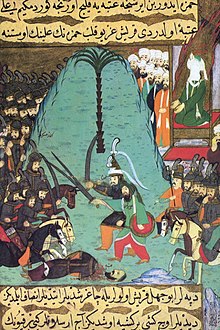Hamza ibn ʿAbd al-Muttalib
Hamza ibn ʿAbd al-Muttalib ( Arabic حمزة بن عبد المطلب, DMG Ḥamza ibn ʿAbd al-Muṭṭalib ; * 567; † 625) was a paternal uncle and companion of the Prophet Mohammed , who accepted Islam at an early age and later supported him in his struggles against the pagan Meccans. He was the son of ʿAbd al-Muttalib ibn Hāschim and Hāla bint Wuhaib.
Life
Hamza accompanied Mohammed in 622 during the hijra to Medina . Seven months later, in Ramadan of the year 623, was Hamza Mohammed Kamel with 30 riders from the Muhajiroun sent out a caravan of at Sif al-Bahr in the field of'Īs Quraysh intercept. On the coast he came across Abū Jahl and 300 horsemen from the Meccans. When the two parties stood up against each other, Majdī ibn ʿAmr of the Juhaina , who was allied with both sides, intervened, so that they withdrew without a fight. Abū Marthad al-Ghanawī acted as Hamza's standard bearer in this action.
Hamza was killed in the battle of Uhud on March 22, 625. An Abyssinian slave killed him with a spear throw.
reception
In Islamic historiography he has long been referred to as a martyr . The Prophet Mohammed is also said to have said: "The Lord of the Martyrs is Hamza ibn Abdul-Muttalib." Hamza is the main character of the Persian epic Hamzanama , which came to Indonesia as Serat Menak in the 16th / 17th centuries and is particularly known there in the version of Serat Menak Sasak .
literature
- GM Meredith-Owens: Art. "Ḥamza ibn ʿAbd al-Muṭṭalib" in The Encyclopaedia of Islam. New Edition Vol. III, pp. 152b-154a.
supporting documents
- ↑ Cf. Leone Caetani : Annali dell 'Islam. Vol. I. Milan 1905. pp. 422f. Digitized
| personal data | |
|---|---|
| SURNAME | Hamza ibn ʿAbd al-Muttalib |
| ALTERNATIVE NAMES | Hamza ibn 'Abdul-Muttalib (full name) |
| BRIEF DESCRIPTION | Companion and uncle on the paternal side of the Prophet Mohammed |
| DATE OF BIRTH | 567 |
| DATE OF DEATH | 625 |
